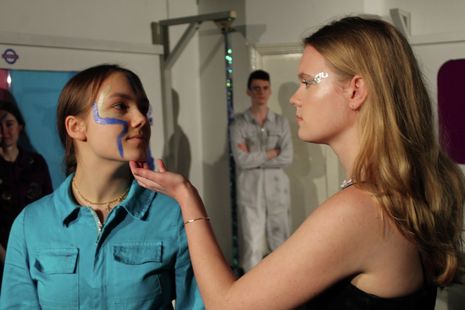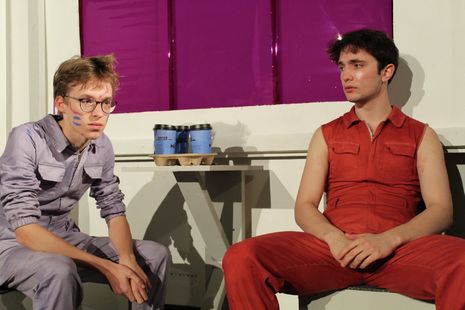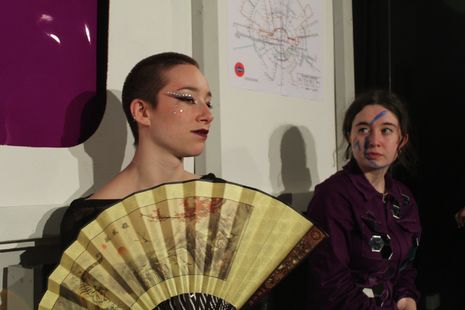What’s in a bad review?
Marianne Porter discusses her experience with being involved in a poorly reviewed production, and suggests how the reviewing system could be improved

Reviewing is inherently contentious, and it should be. Theatre, as with all art forms, is subjective and therefore it is unlikely that any sort of consensus will be reached on a production. Although I have seen brilliant productions which received exclusively five-star reviews, the most ground-breaking productions which truly challenged me were those which left reviewers divided. Perhaps a negative review is therefore confirmation that even if not effectively portrayed, those involved were willing to attempt something different. In student theatre, we have the luxury of being able to try things and make brave choices. Critiquing this and discouraging experimentation in favour of celebrating theatrical conformities seems an error.
I was recently involved in a production of Oscar Wilde’s Salome at the Corpus Playroom. It was a production that received mixed reviews from the various Cambridge theatre sections. The disparity in the number of stars between these reviews, from 2.5/5 to 4/5, was startling. Yet the production set out to do something different and potentially contentious. Instead of setting the play in Biblical times as it is traditionally, our director Olly Francis chose to place it in a pseudo-futuristic DLR carriage. Of course, at first glance, this seems confusing and could be deemed superfluous. However, this decision was made specifically due to the surreal nature of the text, and also detailed her reasoning in an extensive preview. Furthermore, many of the criticisms the production received were rooted in the script itself. I question the validity of tearing apart a script in a review, particularly a script written over a century ago. In performances of new writing, I can understand the logic of criticising this; the writer is an integral part of the theatrical process and is intentionally opening their work up to criticism. Nevertheless, in most cases, the director chooses a script and should be reviewed on their interpretation rather than this initial decision.

A glaring example of the unhelpfulness of tearing down a production based primarily on the script seems to be that of reviews of The Bloody Chamber, performed at the ADC during Michaelmas term. This is particularly pertinent because as it was a freshers’ play; the directors had no role in choosing the script. Speaking to them, it became clear that they themselves shared the frustrations with the script highlighted by reviewers. This made the review seem unjust, or at the very least, poorly researched. The reviewer should have known their lack of involvement in picking the text and focused their review on the other aspects of the performance which were within their control.
A principal issue with Cambridge theatre reviewing is the lack of separation between the reviewers and the reviewed. The shows are performed by students and critiqued by students. This leads the reviews to feel far more personal than they otherwise would. There is no separation between these two, often opposing, forces and many of the reviewers have also put on or been involved in shows. It is far more difficult to accept criticism from someone equally as 'unqualified' as you and unfortunately allows either side to easily dismiss the other.
In student theatre, we have the luxury of being able to try things and make brave choices.
Often overlooked by reviewers are the financial constraints of productions, especially in the context of amateur student theatre, which can prevent the full realisation of a director’s vision. In criticising a perhaps underwhelming set or costumes, it is important to remember that frequently these are not a result of a lack of imagination but rather of funding.
Equally, it seems important to highlight that many of the plays that do receive significant funding and stellar reviews are dominated by male characters and narratives. This seems wholly regressive, particularly as with student theatre we have the opportunity to reject theatre’s patriarchal traditions. It is clear that these plays, many of which form part of the theatrical canon, are easily ascribed five stars, and this sets a dangerous precedent hindering the modernisation and diversification of theatre.

I am, however, not trying to present an argument in favour of wholly positive reviewing, nor am I undermining the importance of reviews overall. If reviews merely focused on the positive aspects of every production, they would all be entirely discredited. Ultimately art, and particularly theatre, a form of art in which the focus is placed so heavily on the audience, must take into account the opinions of its consumers; all of which are valid. It becomes a question of constructive and unconstructive criticism. Tearing apart a script is pointless because it is the foundation of a production upon which all other decisions were made. By all means, criticise the direction, the concept, the tech and all other elements which were actively decided upon by those involved, but avoid disparaging that which is out of their control.
Want to write for Vulture?
Join our writers' groups and be the first to hear about all things Arts, Fashion, Film & TV, Lifestyle, Music and Theatre. Just head to bit.ly/writeforvulture.
Reviews are important. They can encourage ticket sales and they can prevent them. They can help build a director’s confidence or they can destroy it. Sometimes they can have absolutely no impact whatsoever. Theatre is subjective and what is important to remember when receiving a bad review is that it is the opinion of an individual. Nevertheless, reviewers must seek to challenge their own accepted notions of ‘good theatre’ and foster an environment in which experimentation is celebrated and not scorned.
 News / Caius mourns its tree-mendous loss23 December 2025
News / Caius mourns its tree-mendous loss23 December 2025 Comment / Yes, I’m brown – but I have more important things to say22 December 2025
Comment / Yes, I’m brown – but I have more important things to say22 December 2025 Interviews / Politics, your own way: Tilly Middlehurst on speaking out21 December 2025
Interviews / Politics, your own way: Tilly Middlehurst on speaking out21 December 2025 News / Clare Hall spent over £500k opposing busway 24 December 2025
News / Clare Hall spent over £500k opposing busway 24 December 2025 News / King appoints Peterhouse chaplain to Westminster Abbey22 December 2025
News / King appoints Peterhouse chaplain to Westminster Abbey22 December 2025








